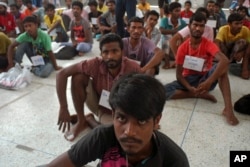Thailand’s prime minister insists he supports democracy and urges patience as a new constitution is being developed for the Southeast Asian country, weeks after an earlier draft's rejection.
"Thai democracy still needs some fine-tuning, whether it is for the constitution … election process and especially governance and how politicians get into politics," said Prayuth Chan-ocha, the retired general who headed the military coup that seized control from a civilian government in May 2014.
Speaking in New York, where he’s attending the United Nations General Assembly, Prayuth told VOA in an exclusive interview Tuesday that Thai people "want to have democracy like other countries. We want to see an end to conflicts…."
In early September, Thailand’s National Reform Council voted down the draft document meant to replace an earlier constitution that the military junta had annulled when it took power. A new draft is due by April. If that’s approved, Prayut said, it would take more time for developing "ancillary laws," holding a referendum and then an election.
The delay extends the military government’s rule until at least mid-2017, junta officials have said.
"People are alarmed that I extend the process. I didn’t extend the process. If it can move faster, it should," Prayuth said. "But we should look [at] whether it will lead to peace."
The unsettled charter has not deterred American firms from doing business in Thailand, the United States’ closest ally in the region, Prayuth said.
"I have met with dozens of U.S. companies in Thailand, and they are happy to continue their investment," he said. "They are not talking to me about democracy. Rather, they are keen to know about changes in regulations and investment benefits."
The American Chamber of Commerce in Thailand has more than 700 corporate partners, according to its website. Among its many prominent names are McDonald’s, Coca-Cola, Philip Morris, Chevrolet and Chevron.
Human trafficking
Prayuth also vowed to take action to fight human trafficking, saying, "The past governments didn’t give [it] much attention. They may have thought it was OK."
The U.S. State Department, in an annual report on global trafficking, said this year that Thailand "is a source, destination and transit country" for forced labor and sex trafficking, with the latter remaining "a significant problem." Trafficking victims include some of the estimated 3 to 4 million migrant workers in Thailand, who are "exploited in commercial fishing" and related industries, as well as in factories and domestic work, the report said.
Prayuth said he needed "to think about how to deal" with undocumented migrant workers, "how to create jobs for them…. If problems are not solved today, they will come back to these people."
He called for "a holistic approach," with help from international organizations. "They set the rules and we broke the rules.… If they see our determination in solving the problem, they will forgive us in the future."
Prayuth has banned public protests, saying it minimizes "provocation of conflict and unrest." But he denied he has further clamped down on freedom of expression in Thailand.
"I'm telling you that I have exercised my power only minimally," he said.
Internet restrictions
But the government recently has raised the prospect of limiting the number of international Internet access points from the current 10 to a single one, sparking fears of a Chinese-style firewall against content that officials find objectionable.
There are other concerns. In August, the U.N. human rights office expressed alarm about the rise in prosecutions under Thailand’s lese majeste law, which prohibits any criticism of the monarchy and deals out lengthy prison sentences for convictions.
Songphot Suphaphon of VOA's Thai service reported from New York; Carol Guensburg, of VOA's News Center, reported from Washington. Ronsanit Onsanit of VOA's Thai service also contributed to this report.






